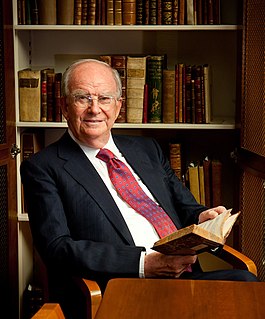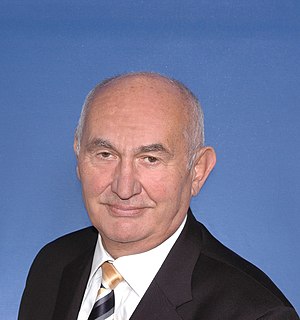
The National Chemical Laboratory (NCL) is an Indian government laboratory based in Pune, in western India.

The Council of Scientific and Industrial Research abbreviated as CSIR was established by the Government of India in September 1942 as an autonomous body that has emerged as the largest research and development organisation in India.

Raghunath Anant Mashelkar, also known as Ramesh Mashelkar, is an Indian Chemical Engineer, born in a village Mashel in Goa and brought up in Maharashtra. He is a former Director General of the Council of Scientific and Industrial Research (CSIR). He was also the President of Indian National Science Academy (2004-2006), President of Institution of Chemical Engineers (2007) as also the President of Global Research Alliance (2007-2018). He was also first Chairperson of Academy of Scientific and Innovative Research (AcSIR). He is a Fellow of the Royal Society, Fellow of the Royal Academy of Engineering (FREng), Foreign associate of US National Academy of Engineering and the US National Academy of Sciences.

Sir John Meurig Thomas, also known as JMT, was a British scientist, educator, university administrator, and historian of science primarily known for his work on heterogeneous catalysis, solid-state chemistry, and surface and materials science.

The CSIR-Indian Institute of Chemical Technology is a national-level research center located in Hyderabad, Telangana, India under the Council of Scientific and Industrial Research (CSIR). IICT conducts research in basic and applied chemistry, biochemistry, bioinformatics, chemical engineering and provides science and technology inputs to the industrial and economic development of the country. IICT has filed one of the maximum CSIR patents.
Tobin Jay Marks is the Vladimir N. Ipatieff Professor of Catalytic Chemistry, Professor of Material Science and Engineering, Professor of Chemical and Biological Engineering, and Professor of Applied Physics at Northwestern University in Evanston, Illinois. Among the themes of his research are synthetic organo-f-element and early-transition metal organometallic chemistry, polymer chemistry, materials chemistry, homogeneous and heterogeneous catalysis, molecule-based photonic materials, superconductivity, metal-organic chemical vapor deposition, and biological aspects of transition metal chemistry.

Jean-Marie Basset is a French chemist, and is currently the director of KAUST catalysis research center.

James Carl Stevens, a chemist, was the first Distinguished Fellow, at the Dow Chemical Company, retiring in January 2015. His area of expertise is organometallic chemistry and his primary field of research is in the area of polyolefin catalysis, particularly in the area of polyethylene, polypropylene, ethylene/styrene copolymers, and the combinatorial discovery of organometallic single-site catalysts. Stevens major contributions have come in the discovery and commercial implementation of single-site polyolefin catalysts. He invented and led the commercialization of constrained geometry catalyst for the polymerization of olefins. These have been commercialized by Dow as a number of polymers, elastomers and plostomers.

Garikapati Narahari Sastry is an Indian chemist. He has taken charge as Director of CSIR-North East Institute of Science and Technology, Jorhat, Assam on 19 February 2019. He heads the Molecular Modelling Division at the Indian Institute of Chemical Technology in Hyderabad, India. Sastry has made pioneering contributions in the areas of computational chemistry and computational biology.
Ch. Mohan Rao is an Indian molecular biologist. He holds a Ph.D. in chemistry from the University of Hyderabad. He was a visiting associate at the National Institutes of Health, US, during 1990–92. He was a visiting professor at the Tokyo Science University, Japan during 1996. Visiting Scientist, UTMB, Galveston, USA, Visiting Professor, Protein Research Institute, Osaka, Japan. Adjunct Professor, RMIT University, Melbourne, Australia. He was positioned as director for the Centre for Cellular and Molecular Biology in Hyderabad, India. He is CSIR-Distinguished Scientist and Sir JC Bose National Fellow at CCMB He was awarded in 1999 the Shanti Swarup Bhatnagar Prize for Science and Technology, the highest science award in India, in the Medical Sciences category.
Ayyappanpillai Ajayagosh is an organic chemist, academic and the director of the National Institute for Interdisciplinary Science and Technology. He is known for his studies on supramolecular assemblies and light induced sensor systems and is an elected fellow of all the three major Indian science academies viz. the National Academy of Sciences, India, Indian National Science Academy and the Indian Academy of Sciences as well as The World Academy of Sciences. The Council of Scientific and Industrial Research, the apex agency of the Government of India for scientific research, awarded him the Shanti Swarup Bhatnagar Prize for Science and Technology, one of the highest Indian science awards for his contributions to Chemical Sciences in 2007. He received the TWAS Prize of The World Academy of Sciences in 2013.
Charles T. Kresge is a chemist and retired Chief Technology Officer (CTO) of Saudi Aramco. He was R&D Vice President at the Dow Chemical Company. His area of expertise is inorganic synthesis and his primary field of research is in the area of crystalline aluminosilicate materials, particularly for the discovery of mesoporous molecular sieves.
S Venkata Mohan is an Indian engineer who has specialization in Environmental Engineering, Environmental Biotechnology, Bioenergy, Bioengineering. The Council of Scientific and Industrial Research, the apex agency of the Government of India for scientific research, awarded him the Shanti Swarup Bhatnagar Prize for Science and Technology, one of the highest Indian science awards, in 2014, for his contributions to Engineering Sciences.
Paul Ratnasamy is an Indian catalyst scientist, INSA Srinivasa Ramanujan Research Professor and a former director of National Chemical Laboratory of the Council of Scientific and Industrial Research (CSIR). He was honored by the Government of India, in 2001, with one of the highest Indian civilian awards of Padma Shri.

Alla Venkata Rama Rao is an Indian inventor and chemist, known for his pioneering researches in the field of drug technology. He is the founder of the A. V. Rama Rao Research Foundation, a non governmental organization promoting research and doctoral studies in chemistry and Avra Laboratories, an organization dealing in intermediates and active pharmaceutical ingredients, used in therapeutics. An elected fellow of the Indian National Science Academy, Indian Academy of Sciences, National Academy of Sciences, India, and Third World Academy of Sciences (TWAS), Rama Rao is a recipient of several awards such as TWAS Technology Award, VASVIK Industrial Research Award and Om Prakash Bhasin Award. The Government of India awarded him Padma Shri in 1991 and Padma Bhushan in 2016.

Swaminathan Sivaram is an Indian polymer chemist, inventor, institution builder and a former director of the National Chemical Laboratory, Pune. He is known for his pioneering work on alkylation of tertiary alkyl halides with trialkylaluminum and olefin polymerization and holds the highest number of US patents by an Indian working outside the US. He is a fellow of several significant professional organizations. The Government of India awarded him the fourth highest civilian honour of the Padma Shri, in 2006, for his contributions to Indian science.

Ganapati Dadasaheb Yadav is an Indian chemical engineer, inventor and academic, known for his research on nanomaterials, gas absorption with chemical reaction and phase transfer catalysis. He served as the vice chancellor of the Institute of Chemical Technology, Mumbai from 2009 until November 2019. He is currently the Emeritus Professor of Eminence at ICT Mumbai.
Boyapeti Manoranjan Choudary is an Indian inorganic chemist and a former senior scientist at Indian Institute of Chemical Technology. He is known for his studies on Nanomaterials to Nanomedicine and is an elected fellow of the Indian National Science Academy, and the Indian Academy of Sciences. The Council of Scientific and Industrial Research, the apex agency of the Government of India for scientific research, awarded him the Shanti Swarup Bhatnagar Prize for Science and Technology, one of the highest Indian science awards, in 1990, for his contributions to chemical sciences.
Sumit Bhaduri is an Indian organometallic chemist and was a senior scientific advisor to Reliance Industries. He is known for his studies on metal-carbonyl clusters and to the polymer-supported catalysis and is credited with the development of technology for the manufacture of Ziegler-Natta polypropylene catalyst which is in use with Reliance Industries.
Tushar Kanti Chakraborty is an Indian organic chemist and a professor at the Indian Institute of Science. He has served as a director of Central Drug Research Institute and as a chief scientist at the Indian Institute of Chemical Technology. He is known for the discovery of novel macrocyclic systems and is an elected fellow of the Indian National Science Academy National Academy of Sciences, India and the Indian Academy of Sciences The Council of Scientific and Industrial Research, the apex agency of the Government of India for scientific research, awarded him the Shanti Swarup Bhatnagar Prize for Science and Technology, one of the highest Indian science awards, in 2002, for his contributions to chemical sciences.










